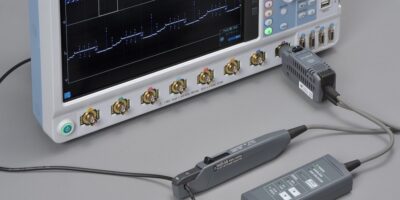Oscilloscope probes from Yokogawa combine proven with new capabilities
Yokogawa has launched a range of high frequency, high voltage differential oscilloscope probes, combining proven features of its existing probes with new capabilities.
The new range replaces six probes with just three, to simplify the choice for development engineers.
Trends for higher voltages in electric vehicles, railway inverters, new energy sources such as renewable solar and high-voltage commercial power lines such as 400V rms have paved the way for oscilloscope probes able to handle these high voltages.
The first probe is the 701977. It builds on the proven 701927 probe and is designed for the evaluation of inverters, including 3.3kV railway drive inverters, and the measurement of high voltage surge noise waveforms.
It has a maximum input voltage of 7,000V peak at 50MHz, with an attenuation ratio of 100:1/1000:1. High voltage black and red alligator clips are supplied as standard.
The second probe is the 701978 which meets the needs of renewable energy, high voltage photovoltaic systems. The probe offers a maximum differential voltage of 1,500V at 150MHz, with an attenuation ratio of 50:1/500:1. It offers the same accessories as the existing 701927 – Pinchertip (red, black), a 1.0m extension lead, a 100 Ohm resistance adapter and a 150 Ohm resistance adapter.
Both probes are powered from the power terminal of DLM oscilloscopes or from separate external power supply and both use BNC type connecters.
The third probe is the 701925. This high frequency differential probe offers a 500MHz bandwidth and a wide input voltage range of ±35V, with an attenuation ratio of 50:1. This makes the probe suitable for measuring high-speed floating and differential signals such as CAN FD. It can be used to measure large surges accurately, which existing differential probes can struggle to achieve, says Yokogawa.
Accessories are as supplied with the 701924 and include 100mm pair leads, 50mm pair leads, red and black micro clip and a 60mm ground extension lead. The 701925 is powered through the Yokogawa probe interface of DLM oscilloscopes.
There are also two new current probes, the 702915 and 702916. These three-range current probes are designed for low current measurement in the development of consumer products, IoT devices and automotive systems. They offer 10 times the sensitivity of conventional current probes as well as having a higher signal to noise ratio (SNR) than existing products, claims Yokogawa.
The bandwidth of the 702915 is DC to 50 MHz (-3 dB), with DC to 120 MHz (-3 dB) for the 702916. With three ranges – 0.5A, 5.0A and 30A – the probes enable a single instrument, an oscilloscope or a Yokogawa ScopeCorder, to analyse all current levels from standby to inrush. They are therefore suitable for the measurement of standby-current of home appliances, automotive parts such as ECUs and industrial equipment, measurement of current consumption and standby current for low power IoT devices and control signal currents and inrush currents in motors and industrial equipment.
Combining the sensitivity of the Yokogawa DLM5000 and the new probes allows manufacturers to measure very low currents of less than a mA, providing analysis of the extremely low standby currents found in vehicle keyless entry systems, explains Yokogawa.




